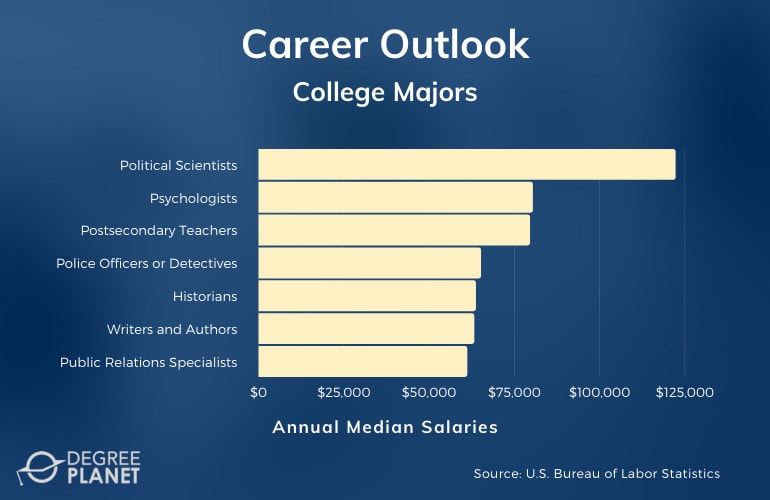If you aren’t a fan of numbers, there are plenty of majors that don’t require math that you can choose from.

A number of degree programs only ask for a single, college-level math course to fulfill their general education requirements.
Editorial Listing ShortCode:
Others might allow you to take a math placement test or equivalency exam to earn your necessary math credits. You don’t have to let algebra stand in the way of obtaining a degree.
College Majors That Don’t Require Much Math
The humanities can be a helpful place to look for college majors without math. You might also consider fields like health and social services. In these fields, you usually only need to prove basic math proficiency before moving on to the subjects that you actually care about.
The following are a few potential fields to consider.
- Communications
- Criminal Justice
- Education
- English
- History
- Human Services
- Liberal Arts
- Management
- Music
- Psychology
All of these fields offer plenty of opportunity for growth, a lot of different job prospects, and plenty of job security.
Communications

A communications degree can be a springboard for many different careers. It’s known as a generalist degree since it covers a wide-ranging area of study that can help prepare you for various jobs in various industries.
Are you comfortable in front of a camera? You may become a reporter, news anchor, or public relations specialist. Do you dream of Hollywood? You may consider a career as a film producer or camera technician.
Editorial Listing ShortCode:
You may even apply a communications degree to executive careers. If you want to pursue business without business-related math classes, this could be a workaround.
Criminal Justice

There’s very little math involved with criminal justice. Whether you’re interested in becoming a detective, prison guard, or parole officer, your coursework will often revolve around law and order rather than fractions and equations.
The exception is the scientific side of criminal justice. For an area like crime scene forensics, you would need more math.
Editorial Listing ShortCode:
For most criminal justice careers, though, you won’t need a calculator. As soon as you’re done with your college’s general education basic math courses, the degree program usually won’t require any more.
Education

There are many education degrees and concentrations that require little math. If you’ll be teaching a wide range of subjects and ages, you might be expected to pass something like Mathematics for Elementary School Teachers.
If you’re interested in teaching a single subject in a middle school or high school, then your degree will often surround that subject. You may only need to take a Math for the Liberal Arts class, depending on your school.
Editorial Listing ShortCode:
You also probably won’t need numbers if you’re considering non-teaching careers in education. These career options may include being a counselor, recruiter, curriculum designer, or educational administrator.
English

English degrees can be very flexible in terms of career options. If you’re interested in the written word, you may become an author, editor, or publisher. If you speak a foreign language, you may become a translator or interpreter.
You may even obtain a bachelor’s degree in English as a foundation for a master’s degree in another subject. For example, it’s common for English teachers to get their Bachelor of Arts or Bachelor of Sciences in English and then their Master of Arts or Master of Sciences in Education.
Editorial Listing ShortCode:
You may also get a bachelors in English in preparation for a masters in a field like library science or social work.
History

A history degree may prepare you to look backwards in time. In addition to learning more about the cultures and conflicts that shaped the world, you may also take classes in reading, writing, researching, archiving, and analyzing.
These are valuable, real-world skills that may transfer to a number of jobs. Depending on your interests, you may choose from a range of careers, from a museum curator to a cultural advisor for the government. A history degree does not usually have any math requirements.
Editorial Listing ShortCode:
As with most of the other degrees on this list, you may only need to get that single general math requirement out of the way.
Human Services

If you enjoy helping people, you may want to consider a human services degree. It’s a broad field that encompasses everything from social work to community outreach and support. It might be just what you need to make a difference in the world.
Common health services careers include counselor, case worker, addiction therapist, child advocate, and nonprofit administrator. If you’re passionate about a particular cause, you may also look into specialized careers for areas such as mental health services.
Editorial Listing ShortCode:
The amount of math that you’ll need for this degree path depends on what you’re studying. A domestic violence therapist won’t work with a lot of numbers, but a benefits coordinator might.
Liberal Arts

Liberal arts is another generalist degree. This degree teaches you the skills that you might need to succeed in multiple types of careers.
Liberal arts jobs can range from the clerical to the creative. You may become an archivist of documents, or you may become a writer, artist, or graphic designer. Depending on your interests, you might find employment in schools, offices, clinics, museums, nonprofits, and more.
Editorial Listing ShortCode:
Some students who pursue a liberal arts degree decide to specialize. If you’re artistic, for example, you may decide to major in liberal arts with an emphasis in art, music, dance, or photography.
If you enjoy cultural studies, you may concentrate on religion or philosophy in different parts of the world. There are many potential career paths you may explore as a liberal arts student.
Management

Business degrees usually require math. If you want to avoid math requirements, a management degree may be a way around it. Management degree programs usually only require business math.
A management degree program may teach you the business acumen that you need to succeed. Its emphasis is on leadership, so there’s usually more of an interpersonal focus within its program. This degree is designed for students who want to have “manager” or “supervisor” in their future job title.
Editorial Listing ShortCode:
A management degree is not always offered at every school, so you may want to research a school’s degree options before you enroll.
Music

Do you live for the beat? Then you may consider pursuing your passion with a music degree. It may improve your employment prospects within the industry, and it also rarely requires math.
The most straightforward music degree is a BA or BS in Music. There are other degree options, though, such as a Bachelor of Music or a Bachelor of Fine Arts in Music. You might also consider majoring in an area like education or health services if you’re interested in a niche career in music instruction or music therapy.
Editorial Listing ShortCode:
You don’t have to strum a guitar to be a music major. You may be more interested in the technical or therapeutic benefits of music. Music degrees may cover multiple career paths and possibilities.
Psychology

You might be surprised to learn how little math is required for a psychology degree. While there are plenty of math electives, they’re usually optional courses for students who want to pursue specialized careers in research or data analysis.
Editorial Listing ShortCode:
It is possible, though, to earn a psychology degree without extra math courses beyond perhaps business math. It depends on what career you want to pursue after graduation. You may talk to your school about their requirements for psychology majors. It might be easier than you think to avoid future math classes.
Careers & Salaries

Whether you’re interested in art, education, law, government, or social science, you may find a variety of high-paying jobs without any kind of math component.
According to the Bureau of Labor Statistics, here are just a few of the most lucrative careers that don’t require math:
| Careers | Annual Median Salaries |
| Political Scientists | $125,350 |
| Psychologists | $82,180 |
| Postsecondary Teachers | $80,790 |
| Police Officers or Detectives | $67,290 |
| Writers and Authors | $67,120 |
| Historians | $63,100 |
| Public Relations Specialists | $62,810 |
| Film and Video Editors and Camera Operators | $61,900 |
| Interpreters and Translators | $52,330 |
| Music Directors and Composers | $52,250 |
Some of these positions, such as historian, political scientist, and postsecondary teacher, would require a masters or doctoral degree in addition to your bachelors.
The Bureau of Labor Statistics reports that education, training, and library occupations make an average of $52,380 per year. Media and communication occupations make $61,310 per year, and social science occupations make an average of $69,760 per year.
Admissions Requirements

Every college has their own admissions process, but a lot of their basic requirements are the same:
- Application. Depending on the school, you might need to submit transcripts, essays, financial information, and letters of recommendation.
- High school diploma or GED. If you don’t have this, you may contact your local community college and ask about programs and prep courses for adult learners.
- SAT or ACT test scores. A growing number of schools are becoming test-optional schools that don’t require the SAT or ACT, but you may still want to keep an eye out for it in admissions criteria.
Even if you don’t meet all of these requirements, it may be worth contacting colleges and expressing your interest in their programs. You might be able to enroll on a conditional basis, or you might even be able to take placement exams or join remedial classes to qualify for admission.
Financial Aid and Scholarships

There are many kinds of financial aid available for college students who qualify. The most well-known is the Free Application for Federal Student Aid (FAFSA). They offer grants, loans, and work-study programs to eligible students.
You may also apply for private grants and loans. You may find these through banks, loan companies, educational foundations, and more. If you’re working, you may also check with your employer to see if they offer tuition assistance. Last but not least, you may consider applying for scholarships.
Editorial Listing ShortCode:
There’s a misconception that you have to be a straight-A student to get a scholarship. In fact, you may qualify for scholarships based on age, gender, income, nationality, location, major, degree type, and more.
What Should I Major in If I Hate Math?

There are many degree options you can choose from that don’t have math requirements. For example, you may choose to study a liberal arts subject, such as art, dance, philosophy, or foreign languages.
Another way to minimize your exposure to math is to try and find an alternative way of fulfilling your college’s math requirements. For example, if you’re required to have at least 3 math credits to graduate, you might be able to earn those credits with a placement test or equivalency exam, like a math CLEP exam.
You may also look into taking a math class like Math for the Liberal Arts rather than the usual College Algebra course.
What Are the Best Majors for People Who Hate Math?

There are many degrees without math requirements, including:
- Communications
- English
- Health Services
- Criminal Justice
- Fine Arts
If your goal is to find majors that don’t require math, you may try looking into the arts, humanities, and social sciences.
You may choose to avoid fields like finance and economics. You may also want to be careful with anything that falls under the science, technology, engineering, and mathematics (STEM) umbrella.
College Majors Without Math Requirements

If you dislike the subject of mathematics, you can still pursue a degree in higher education. There are many degree programs that only ask for a single math class to meet a school’s general education requirements. Some schools are even willing to waive that requirement if you meet certain criteria.
Math doesn’t have to be an uncrossable barrier on your educational journey. You can indeed find a college major that doesn’t require math. If you choose to enroll in an accredited degree program that fits your goals and interests, you may have the opportunity to focus on what you truly want to do.

